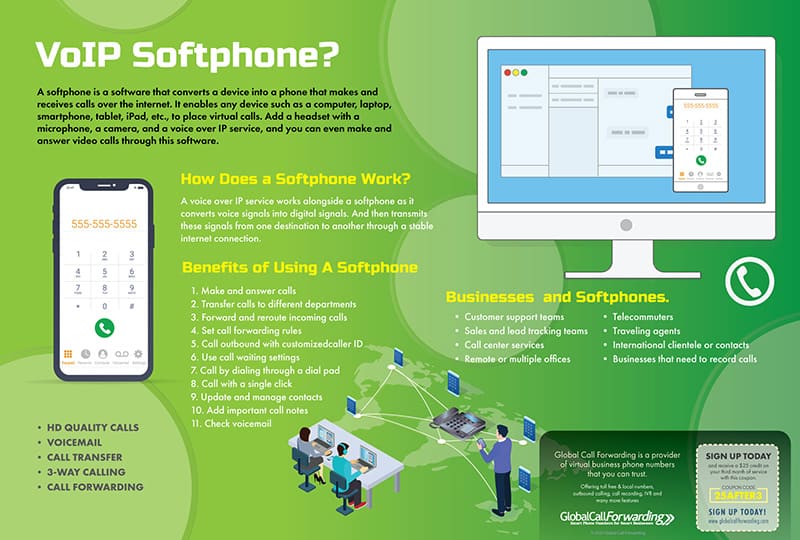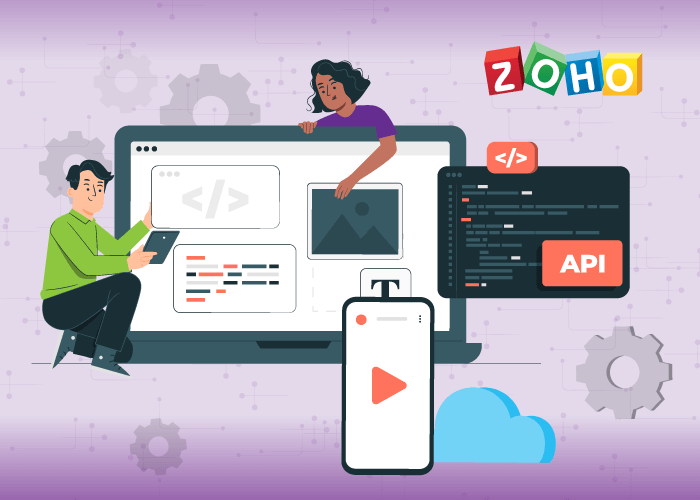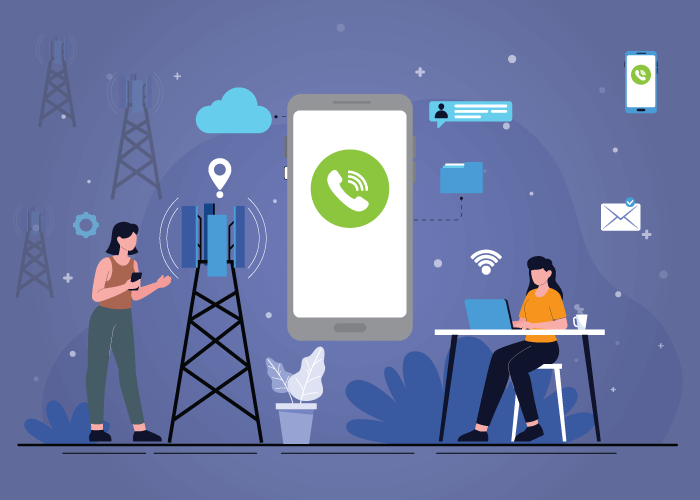When looking for a new business phone system to handle your office communications, you may have come across the term “softphone.” Here we will discuss what a softphone is, its uses, and how your business can benefit from one.
Definition of a Softphone
A softphone is a software that converts a device into a phone that makes and receives calls over the internet. In other words, it enables any device such as a computer, laptop, smartphone, tablet, iPad, etc., to place virtual calls. Add a headset with a microphone, a camera, and a voice over IP service, and you can even make and answer video calls through this software.
A voice over IP service works alongside a softphone as it converts voice signals into digital signals. And then transmits these signals from one destination to another through a stable internet connection. This is how virtual or VoIP calling is possible. Using VoIP technology makes it possible for businesses to stay connected and remain accessible from anywhere in the world.
How Does a Softphone Work?
Softphones run on most devices — Windows, Macs, Android, desktops, laptops, tablets, smartphones, etc. You can use a softphone by downloading a mobile or desktop app or through a web browser. In other words, a softphone is an internet phone that can be used through any IoT device. All you need is a microphone and speaker so that you can make calls without any interruptions. All important phone features are built into the softphone making it a user-friendly and cost-effective business communication solution.
Purpose of Softphones
More and more businesses are switching to VoIP phone systems for their business communications. Because of this reason, softphones are being developed to provide maximum benefit to users. What features come along with your softphone depends on your provider. Some offer extensive, advanced features while others offer basic ones. However, what features you need will be based on what you want to accomplish with your softphone. Consider these questions:
- Do you want to simply make and answer calls?
- Would you also like to set rules for forwarding and rerouting calls during off-hours?
- Would you like a softphone that complements your outbound calling efforts by providing a customizable outgoing caller ID option?
- Is it important for you to be able to update contact information and call notes within your softphone? And so on.
Key Features of a Softphone
Softphones are a flexible workplace communication tool that lets your employees easily connect with each other and with your customers. Most standard softphones will allow you to:
- Make and answer calls
- Transfer calls to different departments
- Forward and reroute incoming calls
- Set call forwarding rules
- Call outbound by customizing your caller ID to display that of the region you are calling
- Use call waiting settings
- Call by dialing through a dial pad
- Call with a single click
- Update and manage contacts (name, phone number, email address, physical address)
- Add important call notes that can be later referenced
- Check voicemail
- And more.
Softphone vs Hardphone vs Deskphones
So, how does a softphone compare against a hardphone or deskphone? And does your business need a softphone or deskphone?
Deskphones are the traditional landline phones individuals use to make and receive calls. Hardphones are similar to traditional deskphones in that they look the same (have a base, screen, handle, and buttons) and are plugged into the workstation.
So, what is the difference between a deskphone and a hardphone? Hardphones are connected to the business’ IP network. So, they make and receive calls using the business’ internet connection instead of traditional phone lines made of copper wires. Therefore, headphones are also referred to as IP phones. Deskphones, on the other hand, work through traditional phone lines.
Softphones take the phone system to the next level by enabling communication through software instead of physical phones. Any device capable of making and receiving VoIP calls can be used as a softphone. Softphones have all the functions of a hardphone and deskphone. And since the software runs virtually, you do not need a traditional deskphone or hardphone set-up. This helps your business cut down on equipment-related costs.
Who Can Use a Softphone?
What types of businesses can benefit from softphones? Who uses a softphone or which teams can benefit from a dialer like this? Companies that have the following services or business factors can utilize a softphone to increase productivity and efficiency:
- Customer support teams
- Sales and lead tracking teams
- Call center services
- Remote or multiple offices
- Telecommuters
- Traveling agents
- International clientele or contacts
- Businesses that need to record calls, and so on
Why Your Business Need a Softphone
The main reason companies are keen on using VoIP is its great cost-effectiveness. With a voice over IP service and softphone, you can:
- Call internationally for lesser fees
- Lower monthly communication charges
- Work remotely or from any location with the same business number
- Use advanced features in one platform
6 Benefits of Using a Softphone
Using a softphone for business communications can lead to higher productivity and connectivity while reducing the amount of money your business spends on its phone system. You can streamline communication, ensure in-house and remote teams are connected, and enhance caller experience.
1. Empower Your Team to Communicate Better
By providing your employees with the right tools and technology, you give them the power to do their job well. A softphone lets employees connect from any device and any location. Its user-friendly interface makes it easy to use without any interruptions or missteps. Furthermore, most softphones integrated conveniently into existing CRMs, making it easy for users to access all information and tools in one place.
2. Use Advanced Phone Features
Equipped with multiple call features, you can create a robust phone system and manage incoming calls in a way that works best for your business. Route calls to different teams, groups, and locations, as needed. Customize caller IDs when making outbound calls. Transfer calls in-house. Add customer notes and check voicemails. Record calls. And more.
3. Connecting Remote Teams
Using softphones for remote teams means increasing team connectivity and collaboration. Employees can see when others are online and can connect with others to collaborate on projects or for knowledge-sharing and handover purposes. This way, no matter where your employees and teams are, they can continue to work together seamlessly.
4. Save on Equipment Costs
Since softphones can be used through any device (smartphone, laptop, desktop), your business can save on providing all employees with deskphone and separate, designated phone lines. Instead, employees can just work out of their desktops or laptops. This goes for remote employees as well who can simply use the softphone through their existing device.
Related: How Much Does a Softphone Cost?
5. Encourage Collaboration & Conferencing
Let employees and users collaborate by enabling them to easily connect with each other, share essential information, knowledge, and documents, as well as jump in on conference calls. Increased collaboration and knowledge-sharing lead to better product development as you identify what works well and what doesn’t with regards to your business and your products.
6. No Need for Additional Phone Lines
Lastly, since these business calls can be made through a software solution and not traditional phone lines, you do not need to add or purchase additional phone lines for your business and new employees. All you need is a VoIP phone service from a provider like Global Call Forwarding. And then, simply add and remove users as needed.
Get a Softphone Today
Are you ready to get a softphone to enhance and streamline your business communications? Global Call Forwarding can help! Sign up for our virtual phone number service and use our GCF Web Dialer for any device to make and answer calls through the internet. Call us at 1 (888) 908 6171 to get started!








